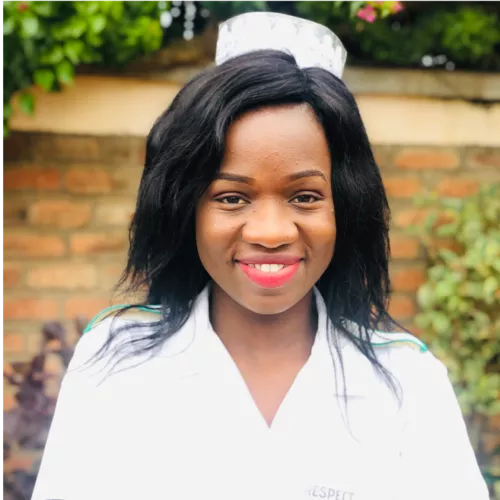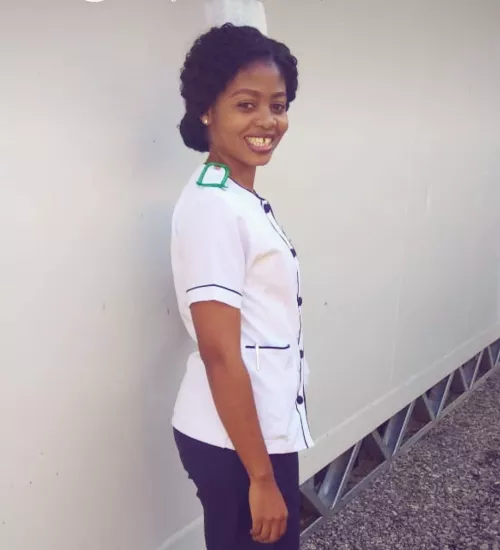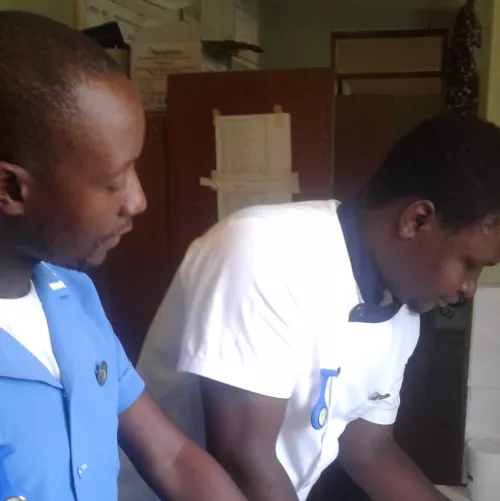Stories of exceptional care at our health facilities
Faith
Faith and I came across a pregnant client with severe preeclampsia. Faith took the lead, using the client's presenting complaint, history, physical assessment, and investigation to diagnose severe preeclampsia. She calmly explained the condition to the patient, developed a midwifery care plan, provided pre-referral management, including administration of hydralazine and magnesium sulphate, and referred the patient to the tertiary care center. I was so impressed with how she managed the patient with so much ease and expertise, so much so that I had to put a badge on her for outstanding service as a distinctive mark for her expertise demonstrated in the management of severe preeclampsia.

Baby Merab
Baby Merab, pictured above during a kangaroo mother care session, was born premature at the 6th month of pregnancy weighing 1.1kg. Her mother was referred from a remote clinic by a midwife due to eclampsia (very high blood pressure in pregnancy), which is one of the leading causes of death among pregnant women. The baby was born through cesarean section with severe respiratory distress due to prematurity. Baby Merab was admitted to Neonatal Care Unit (NCU) at JJ Dossen Memorial Hospital, under care of GAIN mentors and their mentees. The baby developed severe jaundice and other complications associated with prematurity. The nursing team, under mentorship from GAIN mentors, provided specialized care for 77 days where the baby received close monitoring, antibiotics, phototherapy among other services. To maintain the baby’s delicate body temperature, the mother was taught kangaroo mother care, a procedure where the infant is carried by the mother with skin-to-skin contact. The baby was discharged home weighing 2.3kg. Prematurity is one of the leading causes of neonatal death. Following war and Ebola, Liberia’s health system faces serious challenges with severe shortages of specialized nurses. Through GAIN support under the nursing workforce expansion program, the NCU at JJ Dossen Memorial Hospital is now managed round the clock by competent neonatal nurses. Since its inception in early 2020, this specialized neonatal care unit has since nursed more than 300 neonates referred from within Maryland County and the two neighboring counties in southeastern Liberia.
NASG
Beatrice delivered at JJ Dossen memorial hospital through caesarean section. During her recovery period at the ward, the midwives noticed that she was having postpartum hemorrhage (PPH)—severe bleeding following childbirth. Through the GAIN mentorship program, midwives had been practicing management of PPH through the various procedures (pictured above practicing management of PPH with a non-pneumatic antishock garment). The midwife quickly initiated the PPH management emergency protocol and called for assistance from other midwives and the doctor on call. As part of emergency preparedness, the team had prepared a PPH emergency kit (a prepackaged set with all basic requirements for managing bleeding following childbirth) during a previous GAIN training session. After attempting to save the mother through the initial interventions, the bleeding persisted so the midwives quickly applied a non-pneumatic antishock garment on the mother which helped stabilize her before the arrival of surgical team. The patient was taken to the operating theater where the bleeding was managed through surgery. Antishock garments are a cheap yet highly efficient tool for managing PPH in low resource settings. As part of the GAIN intervention, all midwives at the hospital are trained on the use of antishock garments to manage PPH. The program also provided five garments for training and use by the midwives to save maternal lives in southeastern Liberia. These garments are currently used as part of the essential lifesaving equipment for managing bleeding during and after delivery.

BEmONC
The GAIN program in partnership with Partners In Health, spread its roots to the southeast region of Liberia, one of the most remote and neglected parts of the country. The program in collaboration with the Liberia Ministry of Health (MoH) in Maryland County targets to develop a nursing and midwifery workforce based on sound evidence-based practices and skills in prevention of maternal and neonatal deaths. In this post-war and Ebola era, Liberia currently has one of the lowest health workforce densities with big gaps in nursing. As part of expansion of workforce goals, GAIN established a pilot fellowship program targeting young emerging nursing and midwifery leaders in the maternity ward, neonatal care unit, and operating theater. The fellowship program recruits fresh nursing and midwifery graduates from the region. Upon enrollment in the program, the fellows undergo a blended mentorship program comprising of didactic sessions and clinical practical sessions for six months after which they continue for another six months under close mentorship by GAIN mentors. The mentorship involves key topics including fundamentals of quality improvement in healthcare, Basic Emergency Obstetric and Neonatal Care (BEmONC), leadership skills in maternal and child health, and basic obstetric lifesaving skills among other topics. Every fellow is issued with a fellowship passport (a simplified guide to track their progress throughout the program).
Stories from our mentors
Luseshelo Simwinga
GAIN expert mentor in Blantyre, Malawi
Being a midwife is one of the most thrilling and satisfying experiences I have had in my life. The joy of helping a mommy bring out a life is one inexplicable feeling I’ve had every time I attend to a delivery over the past seven years and 4,704 deliveries.
My satisfaction is inextricably intertwined with the satisfaction of the women I assist, and it always leaps to a new level when the woman I have assisted is also satisfied with the care I have rendered to her. The experience of quality, respectful, and dignified care rendered to a woman during her labour and delivery, when she is most vulnerable, in pain and helpless, sticks to her for the rest of her life. However, all this sweet experience of being a midwife takes a sour turn when one is working with inadequate resources. When one puts in all her efforts to provide quality, respectful, and dignified care with improvisations which put the lives of mothers and neonates in grave danger.
I had an experience yesterday and I’ve had a heavy heart ever since. I am only writing about it now because the baby is out of harm’s way. It was forty-minutes after helping a first-time mommy bring out her precious and healthy baby, that I checked her umbilical cord that I had tied with a clean gauze bandage because the health facility and many other health facilities do not have proper cord clamps to keep babies from bleeding out from their umbilical cords. I had the shock of my life to see her covers soaked with blood from her fresh umbilical cord. My heart shattered into uncountable pieces as I observed her innocent face which had turned pale due to the bleeding. With my colleagues we re-secured the cord with more yarn and made sure she was not bleeding, explained her condition to her anxious mommy and granny, and referred her out to an advanced nursery ward for a possible transfusion. I kept following up on her until I was told she had been transfused and doing well. This was a life nearly lost due to lack of a simple and cheap cord clamp and essential vitamin K prophylaxis.
Mphatso Sayenda
GAIN expert mentor in Neno, Malawi
Among many reasons for my pride in being a midwife is the precious opportunity to witness the first breath of a human being. Midwives are essential in the birth process as they care for a woman from conception to birth of the baby. Taking time at each stage of pregnancy and childbirth to make sure that the mother and baby are doing well by giving health education, assessing the pregnant mother, and intervening when any problems arising are the most important parts of my job.
I will share one of many experiences with you during my work as a midwife. During a visit at a rural health center in Malawi to mentor a midwife working there, I found him very busy with a lot of women who came for antenatal care. I assisted by checking the blood pressure of women waiting. It was then that I encountered a pregnant woman with very high blood pressure and impending signs of eclampsia. She also told me that her previous baby was delivered while she was unconscious due to eclampsia. I made a diagnosis of severe preeclampsia, we gave the mother the first line of treatment and called for an ambulance to take her to a higher level facility. While there, she safely delivered and both the mother and baby are alive.
I met her on a follow up visit and she was all thankful to the midwives saying "You helped me a lot, if not for your interventions, I would have had convulsions and died." These kind of experiences make me proud to be a midwife.
Isaac Mphande
Former GAIN expert mentor and current Primary Healthcare Nursing Manager in Neno, Malawi
Being a midwife is something that has to come from your heart as a person. I first trained as a medical surgical nurse and it took me a year of practice at that level to make a decision to become a midwife. The major influencer of my decision at that point was my passion of babies which stems from the reaction that comes from the family members when a baby is born. I hope we can all tell the joy that childbirth brings to the mother, father, and family at large. On the other hand, when pregnancy ends in a baby dying due to any reason whether at birth or before birth, the psychological trauma is devastating to all the people including the midwife. Further to that, our societies do not treat neonatal deaths the way adult death are viewed such that burial is only done by a few women and no coffin is provided. More importantly, I share what Dr. Paul Farmer believes in—“no life matters less.” This idea inspires me throughout my career. My job is to make sure that babies and their mothers are safe during childbirth. Becoming an expert mentor with GAIN was a solution to my dream because it gave me an opportunity to impart my skills to new midwives in the profession, especially in remote areas such as Neno district, Malawi, where midwives are needed the most. I would love become a global leader in maternal and childbirth and continue making decisions to safeguard childbirth and make it a joyful event.

Annie Weah
GAIN expert mentor and community midwife in Maryland County, Liberia
I am a midwife and worked with the Ministry of Health in Maryland, Liberia for nine years before joining Partners In Health, where I have been a community midwife and clinical mentor for the past three years. I have encountered many challenges managing maternal complications, like postpartum hemorrhage, due to inadequate or incomplete emergency preparedness. One of the many challenges is the availability of essential supplies to manage maternal complications, despite nurses and midwives having the skills to do so. Given my experience, I was eager to create an emergency preparedness tray to aid the management of maternal complications once we received the essential supplies. The emergency trolley has wheels and can be moved between delivery beds and rooms, given that space is also a challenge. Prior to building a bigger maternity ward, when an emergency came, movement was difficult as the space was tight. I am glad to now have the space and supplies to set up an equipped emergency trolley so we can be ready to manage complications. The staff is very cooperative in refilling the trolley and we do general inventory twice a week to ensure it is fully stocked and ready for any complications that arise. The wheels on the trolley make movement between beds very easy and the four labeled compartments make it simple to find what we need given the complication. There are four compartments, one for each of the main complications we see; postpartum hemorrhage, preeclampsia/ eclampsia, a general maternal emergency tray, and essential supplies needed in childbirth.

Marshall Sackey
GAIN neonatal nurse clinical mentor in Maryland County, Liberia
During my time working in obstetrics, I have worked with many midwives. While most are professional and provide respectful and dignified care to their patients, there have been times when I have witnessed or heard of unprofessional and disrespectful treatment. Any unprofessional and unethical treatment of birthing women from a midwife directly undermines the integrity of the profession. Additionally, any disrespect of a woman during childbirth should be considered malpractice.
It is my firm belief as a midwife that we must uphold a high quality of care and provide dignified, human-centered care to anyone who arrives at the hospital for medical treatment. Midwives must give one hundred percent respect to birthing women because, as a midwife, they have been entrusted by pregnant women as the early god in that moment. On this note, I thought to write and share an op-ed strongly highlighting the theme of Respectful Maternity Care with “Standing Against Maltreatment of the Birthing Person,” which was published in The Global Alliance for Nursing and Midwifery Blog in September 2022.




